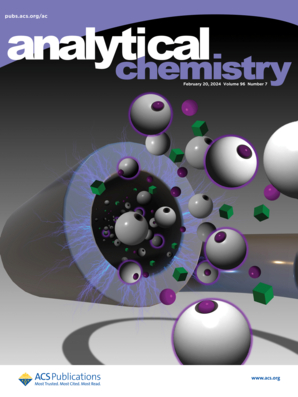一种用于超灵敏定量体液中胶原蛋白的病理胶原靶向纳米酶芯片。
IF 6.7
1区 化学
Q1 CHEMISTRY, ANALYTICAL
引用次数: 0
摘要
病理性胶原蛋白在肿瘤、纤维化疾病和骨关节炎的进展中成为一个关键的生物标志物。病理胶原蛋白的精确定量具有关键的诊断价值,为胶原蛋白相关疾病的早期检测提供了一种无创方法。本文首次构建了一种病理胶原靶向纳米酶生物芯片(PCC),用于对体液中的病理胶原进行超灵敏定量分析。PCC生物传感器由高亲和力病理胶原靶向纳米酶(Pacotzyme)和捕获表面组成,用于高效富集未结合的Pacotzyme。PCC已被证明可以定量分析病理胶原在0.1至10000 ng/mL的宽浓度范围内,LOD低至15 pg/mL。PCC在复杂的生物环境中表现出稳定和精确的性能,其特征是蛋白质含量升高、离子强度高和葡萄糖水平升高。此外,PCC在多种体液(包括血清、尿液、唾液和滑液)中表现出一致和可靠的功能。值得注意的是,PCC芯片已成功应用于通过定量体液中的病理胶原蛋白来检测癌症、纤维化和骨关节炎。特异的纳米酶生物传感器为胶原蛋白相关疾病的早期筛查和无创诊断提供了一种有前景的诊断工具。本文章由计算机程序翻译,如有差异,请以英文原文为准。
A Pathological Collagen-Targeting Nanozyme Chip for Ultrasensitive Quantification of Collagen in Body Fluids.
Pathological collagen emerges as a critical biomarker in the progression of tumors, fibrotic disorders, and osteoarthritis. The precise quantification of pathological collagen holds critical diagnostic value, offering a noninvasive approach for early detection of collagen-associated disorders. A pathological collagen targeting nanozyme biochip (PCC) has been constructed for the first time to ultrasensitively quantify pathological collagen in body fluids. The PCC biosensor consists of a high-affinity pathological collagen targeting nanozyme (Pacotzyme) and a capture surface for efficient enrichment of unbound Pacotzyme. The PCC has been demonstrated to quantitatively analyze pathological collagen across a wide concentration range from 0.1 to 10000 ng/mL, with an LOD as low as 15 pg/mL. PCC demonstrates robust and precise performance in intricate biological environments characterized by elevated protein content, high ionic strength, and increased glucose levels. Moreover, PCC exhibits consistent and reliable functionality in diverse body fluids, including serum, urine, saliva, and synovial fluid. Notably, PCC chips have been successfully applied to detect cancer, fibrosis, and osteoarthritis by quantifying pathological collagen in body fluids. The specific nanozyme biosensor offers a promising diagnostic tool for the early screening and noninvasive diagnosis of collagen-related diseases.
求助全文
通过发布文献求助,成功后即可免费获取论文全文。
去求助
来源期刊

Analytical Chemistry
化学-分析化学
CiteScore
12.10
自引率
12.20%
发文量
1949
审稿时长
1.4 months
期刊介绍:
Analytical Chemistry, a peer-reviewed research journal, focuses on disseminating new and original knowledge across all branches of analytical chemistry. Fundamental articles may explore general principles of chemical measurement science and need not directly address existing or potential analytical methodology. They can be entirely theoretical or report experimental results. Contributions may cover various phases of analytical operations, including sampling, bioanalysis, electrochemistry, mass spectrometry, microscale and nanoscale systems, environmental analysis, separations, spectroscopy, chemical reactions and selectivity, instrumentation, imaging, surface analysis, and data processing. Papers discussing known analytical methods should present a significant, original application of the method, a notable improvement, or results on an important analyte.
 求助内容:
求助内容: 应助结果提醒方式:
应助结果提醒方式:


